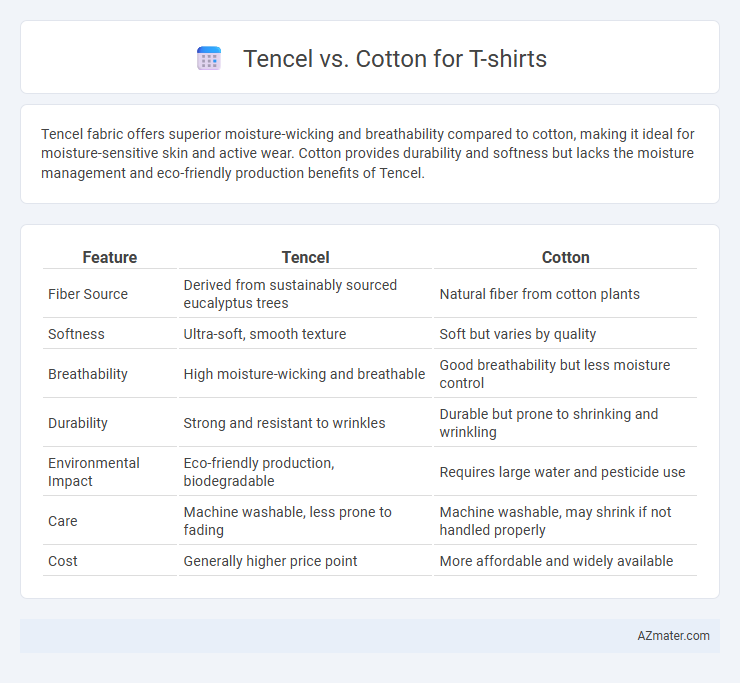Tencel fabric offers superior moisture-wicking and breathability compared to cotton, making it ideal for moisture-sensitive skin and active wear. Cotton provides durability and softness but lacks the moisture management and eco-friendly production benefits of Tencel.
Table of Comparison
| Feature | Tencel | Cotton |
|---|---|---|
| Fiber Source | Derived from sustainably sourced eucalyptus trees | Natural fiber from cotton plants |
| Softness | Ultra-soft, smooth texture | Soft but varies by quality |
| Breathability | High moisture-wicking and breathable | Good breathability but less moisture control |
| Durability | Strong and resistant to wrinkles | Durable but prone to shrinking and wrinkling |
| Environmental Impact | Eco-friendly production, biodegradable | Requires large water and pesticide use |
| Care | Machine washable, less prone to fading | Machine washable, may shrink if not handled properly |
| Cost | Generally higher price point | More affordable and widely available |
Introduction: Tencel vs Cotton for T-Shirts
Tencel and cotton are popular fabrics for T-shirts, each offering distinct benefits in comfort and sustainability. Tencel, made from sustainably sourced wood pulp, is known for its softness, moisture-wicking properties, and eco-friendly production process. Cotton remains favored for its breathability, durability, and natural feel, but often requires more water and chemicals in cultivation compared to Tencel.
What is Tencel?
Tencel, a brand name for lyocell fibers, is a sustainable fabric made from sustainably sourced wood pulp, primarily eucalyptus trees, processed through an environmentally friendly closed-loop system. It offers superior moisture-wicking properties, breathability, and softness compared to traditional cotton, making it ideal for comfortable T-shirts with better durability and reduced environmental impact. While cotton remains popular for its natural feel and affordability, Tencel's eco-friendly production and enhanced performance make it a preferred choice in sustainable fashion and activewear.
What is Cotton?
Cotton is a natural fiber derived from the seed hairs of the cotton plant, widely valued for its softness, breathability, and moisture absorption, making it a popular choice for T-shirts. It offers durability and comfort but can retain moisture longer, potentially causing less efficient drying compared to fibers like Tencel. Cotton's biodegradability and widespread cultivation contribute to its prominence in textile manufacturing, though it requires significant water and pesticide inputs during farming.
Softness and Comfort Comparison
Tencel fibers offer superior softness compared to cotton due to their smooth, round structure, which feels gentle against the skin. Tencel's moisture-wicking capabilities enhance breathability, providing greater comfort in warm or humid conditions than traditional cotton. Cotton remains breathable but tends to retain moisture longer, potentially causing discomfort during extended wear.
Moisture-Wicking and Breathability
Tencel fibers exhibit superior moisture-wicking properties compared to cotton, rapidly absorbing and releasing sweat to keep the skin dry and comfortable. Its breathable structure promotes enhanced airflow, reducing heat retention during physical activities. Cotton, while breathable, tends to retain moisture longer, which can lead to a clammy feel and slower drying times in T-shirt fabrics.
Durability and Longevity
Tencel fibers exhibit superior durability compared to cotton due to their inherent strength and resistance to wear and tear, making Tencel T-shirts longer-lasting under frequent use. Cotton, while soft and breathable, tends to degrade faster with repeated washing and exposure to sunlight, resulting in a shorter lifespan. Tencel's moisture-wicking properties also help maintain fabric integrity over time, enhancing the longevity of T-shirts made from it.
Environmental Impact and Sustainability
Tencel, derived from sustainably managed eucalyptus forests, offers a lower environmental footprint compared to traditional cotton, requiring up to 95% less water and fewer pesticides during cultivation. Cotton cultivation is water-intensive, often leading to soil degradation and significant pesticide use, impacting ecosystems negatively. The biodegradability of both fibers contributes to sustainable fashion, but Tencel's closed-loop production process reduces chemical waste, making it a more eco-friendly choice for T-shirts.
Care and Maintenance Differences
Tencel T-shirts require gentle washing in cold water and should be air-dried to maintain their softness and prevent shrinkage, whereas cotton T-shirts can often withstand warmer washes and machine drying without significant damage. Tencel's moisture-wicking and wrinkle-resistant properties reduce the need for frequent washing and ironing, in contrast to cotton, which may fade and become prone to wrinkles over time. Proper care for Tencel extends the fabric's lifespan by preserving its smooth texture, while cotton benefits from durability but requires more maintenance to avoid shrinkage and color loss.
Price and Value Considerations
Tencel T-shirts generally cost more than cotton due to their sustainable production process and superior moisture-wicking properties, making them a premium option in the market. Cotton remains widely popular for its affordability and breathability, providing good value for everyday wear. Choosing between Tencel and cotton depends on whether durability, eco-friendliness, and comfort justify a higher price compared to the budget-friendly and versatile nature of cotton.
Which Is Better: Tencel or Cotton for T-Shirts?
Tencel outperforms cotton in moisture-wicking and breathability, making it ideal for activewear and hot climates. Cotton, especially organic varieties, offers durability and softness but absorbs more moisture, which can lead to longer drying times and potential discomfort. For sustainable fashion and sensitive skin, Tencel's eco-friendly production and hypoallergenic properties provide significant advantages over traditional cotton.

Infographic: Tencel vs Cotton for T-shirt
 azmater.com
azmater.com